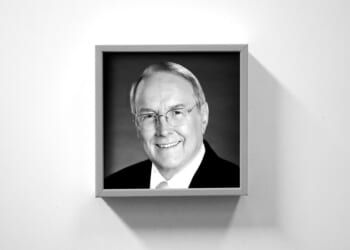Much has been made of the daunting challenges of our times—from the global economy to artificial intelligence—with leaders from the left, right, and center all discussing how to overcome them. The people who aim to fix these supposed crises: tech-bro engineers in Silicon Valley.
Tech leaders such as Peter Thiel, Elon Musk, former Google executive Larry Page, and OpenAI’s Sam Altman have decided how they are going to handle global challenges. But are they offering the best solutions?
One recent example: The left-leaning techno-optimistic worldview from Ezra Klein and Derek Thompson in their book Abundance envisions a future where technology can fix problems of plummeting biodiversity and food scarcity, on the condition that we deregulate as much as possible and let the engineers fix the planet.
Klein and Thompson claim progressive governments are harming our progress by overregulation. They lament losing Silicon Valley engineers, such as Peter Thiel and Elon Musk, to right-wing politicians.
Many engineers see the world through that same lens: There are structural problems in our society, such as bad traffic and food shortages, and we can fix them with mere technological solutions. Musk, for example, founded his electric-car company Tesla to accelerate humanity into a sustainable economy, but is now focused on exploring Mars and addressing the population decline.
But what these technical solutions don’t address is humanity’s empty hedonism and our global economy’s dependence on Western culture’s extravagant consumerism.
Other leaders from Silicon Valley recognize that people are the problem and humanity is broken. We need food for our bodies, and our bodies are frail and need care and attention. Their solution: What if we could have superhuman bodies that transcend our limitations as humans?
Google cofounder Larry Page and Elon Musk have clashed on this issue in the past, as Page is a proponent of transhumanism and believes there are too many humans, whereas Musk is not a transhumanist. Page has labeled Musk a “speciest” in the past, where Musk allegedly replied that, yes, he was “pro-human.”
Peter Thiel, cofounder of PayPal and Palantir Technologies, lamented the limits of our bodies on a podcast with The New York Times’s Ross Douthat. Christians especially should strive to overcome these limits in transhumanistic ways, Thiel said. Are our souls not more important? Should we not strive to make a better embodiment, as we will eventually get new bodies?
Musk has repeatedly spoken on the matter of eternal life through an uploaded personal consciousness. It would not be for him, he says. He wants peace of mind when he dies, he has said, no consciousness—just the “sweet release of death.” But with his invention of Neuralink, the brain-machine-interface chips in human volunteers, Musk draws a fine line with a techno-optimistic view.
Musk also sees space exploration as a way to save humanity. Tesla and Neuralink are meant to prolong life on earth, but SpaceX is meant for expanding life to other planets. Mars colonization, as Musk sees it, would not be to escape earth but to reduce the risk of our civilization being wiped out by a mass event such as an asteroid or virus. It would not mean a utopia for the rich but a difficult place to live for adventurous people who could form the first step in becoming multiplanetary as a species.
Finally, in addition to fixing climate and human frailty, some engineers and economists would prioritize a technological fix to our governing bodies, which they see as slow moving, overregulated, and too “woke.” We should move beyond democracy, some like blogger-turned-philosopher Curtis Yarvin argue, and forcibly toward an autocratic technocracy, where engineers and economists in liaison with artificial intelligence would make decisions for the good of the people.
But some of the biggest tech bros—Musk, Altman, and Meta’s Mark Zuckerberg—want to keep democracy alive in its current form and increasingly want to keep freedom of speech less restricted and censored. Musk favors a direct democracy on Mars, where inhabitants would vote for policies, instead of a two-tier system.
Others, like Alexander Karp and Nicholas Zamiska, two leaders from Palantir, would like to dismantle the old order that was too focused on simply building an individual-consumer state with no ideals. They see the future of the West as a technological republic, where there would be less bureaucracy and more “freedom to build, ownership of … success, and a commitment above all to results.” Instead of creating the next social app, engineers would build technologies to stop other governments from overrunning Western countries.
While a tech future in AI, democracy, and environmental solutions might sound exciting to some and uncompelling to others, Christians have always had a nuanced and hopeful response to the world’s greatest difficulties. First, Christians can encourage a holistic perspective, and that applies to AI and the preservation of democracy. Tech leaders or engineers often see the world through the lens of their hammers and software programs, and it is easy to condemn them for their reductionist view of the world and its problems.
But an overspiritual view of the challenges of this world has the same problem; seeing our world only through the lens of morality (“Poor families are broken because of divorce” or “We should just consume less, and the food shortage problem would be solved”) is reductionistic as well.
A Christian worldview could help us understand the problems of our times by seeing any challenge more holistically. Dutch philosopher Herman Dooyeweerd argues there are 15 or more different aspects of being in any phenomenon. We should look at a thing not only technically and physically (how many there are, how it moves, where it is located, how it reacts in its environment) but also psychologically, legally, morally, religiously, and so on through other perspectives.
We need this holistic worldview, where the solutions of the engineer, the legal and communal ideas of a politician, and the moral virtues of all bring change for good. We should also be wary to fight our transhumanistic tendencies, not just the obvious ones from Page or Thiel (an overspiritual view of our bodies, discarding their need for safety). We have a faith that upholds the human body and has the bodily resurrection as core belief, and we have a hope that says our bodies do count for us.
Second, Christians should not be afraid to advocate for democratic values and democracy, which are founded on Christian principles of fairness, justice, and a belief that no human being (including lawmakers) is above the law. The Great Commission to go and tell the Good News as Christians and churches is compatible with the great good of advocating the freedom of religion for all, as the Good News cannot and should not be forced upon anyone since the Spirit of the Lord works without force (Zech. 4:6). Good regulations from our Christian tradition are worth arguing for in a democracy—and worth implementing—but limited to the rules of democracy and the freedom of conscience and speech.
Third, we can counter the perspectives of Silicon Valley with a sound view on ethics. The recent techno-optimistic view—that if we were to prolong AI, we would find right and wrong through computation and reasoning alone—sounds promising. Is an impartial, reasoning, computer-engineered morality what we need in our time? “Up until modern times, if you were stronger, you were right. Now, we’ve flipped it to if you’re weaker, you’re right,” Musk has said. “But neither is true. … You have to look at morals in the absolute.”
A Christian view on ethics also has impartiality at its core: “Do not pervert justice; do not show partiality to the poor or favoritism to the great, but judge your neighbor fairly” (Lev. 19:15). Our Scriptures have many verses on how we should view our poor neighbors, how we should take care of them and do them justice, but that does not mean we should favor them in court or see them as more moral than others.
We should take into account all voices, but we often forget the poor—that is why Scripture often stresses that God sees the poor when others do not. To walk humbly in the way of the Lord and to do justice (Mic. 6:8), we need to learn God’s wisdom. We can’t download spiritual discernment into our brains; we need practice to gain it. We need to lift weights ourselves in the gym to gain muscle; we cannot delegate the weightlifting to a forklift. The same applies to AI and ethics: We need to lift our spiritual weights ourselves to gain wisdom, insight, and virtues.
As we unlearn our addictions to our screens, whether we’re bingeing, streaming, or doomscrolling the news on traditional or social media, we must turn our attention to how we want to shape our world, recovering it and restoring it to the glory creation is showing to its Creator.
We are not simply shaped by our time of artificial intelligence and techno-optimism. We are also active agents in the world, called to create good technology, beautiful art, restorative education, and just policies. It is important to acknowledge our own and others’ moral failings in designing and executing culture and technology in our economy and democracies.
Christians, especially those in tech and engineering, can help shape a better world that points to the kingdom to come, where justice reigns and where technology is meant to restore rather than destroy.
Maaike E. Harmsen is a Reformed theologian, ethicist, writer, and PhD candidate in the Netherlands.
The post Can the Tech Bros Save the World? appeared first on Christianity Today.


















